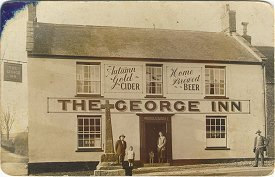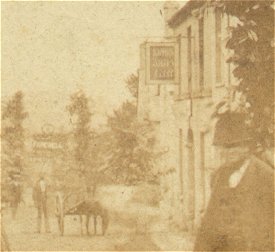"The Winsham I Remember"
|
|
The
Pubs I only wish I could turn the clock back half a century, when we had three thriving Inns, which all provided an excellent living for, the then, tenants. Today we have but one, and that one has to be subsidised to keep going, and it would seem its future is doubtful if the general trend is followed. (Our neighbouring village of Thorncombe recently lost the last of their three pubs).  The Top Pub, as it was always known, but its rightful name was The George, was run by a very dear old lady named Ann Peadon, and it is of interest to record that she served in that house completely unassisted until she was in her middle nineties. I once saw in the trade paper that she was the oldest licence holder in the whole of the country, and I well remember the occasion when the brewers made her a special presentation after she had held the licence for a certain number of years. I also remember when the Great War started, a recruiting meeting was held in the Jubilee Hall, and volunteers were called for, to serve in the Somerset Light Infantry. Men and boys came readily forward, the youngest being my own cousin who was barely sixteen, but gave his age as eighteen, and served all through the whole of the war. The reason for recalling this incident is the fact that the very next morning, all those who had registered, paraded at the village cross, outside of the George, where after the roll call, the transport arrived, but before they left, the old lady presented each and every one with a pint of beer, and a silver sixpence, which of course had a much greater value in those days when a pint of beer cost two pence and a packet of woodbines a penny. The George Inn was mostly patronised by the older men, and cider drinkers, but all three pubs had their regulars, who rarely moved from their own house of choice. Now the middle pub, known for generations simply as "Tommy's", was in fact "The Kings Arms", run by Tommy Ackland, this pub was by far the liveliest of the three, and was patronised by all the younger people and was for many years the headquarters of both the Football Club and the Village Brass Band. Every night there would be several card schools in play, not to mention such pleasant pastimes as Darts, Table Skittles and a ring Board. I am not sure why "Tommy's" should be so popular, but the fact that Tommy had a wide selection of very attractive daughters might well have had some bearing on it in later years. To get into Tommy's at all, on the evenings when there was a social or dance in the Jubilee Hall opposite, was something of an achievement, as the place would be absolutely packed. Everyone called in to be regaled for the occasion and when we finally crossed the road to go to the dance we were well lit up, and what a night it would be, everybody enjoying life to the full, you might meet  people
you hadn't seen for some time, who had arrived from neighbouring
villages and outlying farms, mostly on foot, and many had walked many
miles to be there. It was always well worth the effort, the place was
always packed to capacity, very little room left to dance, but that
mattered little, you were in the spirit of it, and the company
mattered most. Everyone knew one another and it was just one giant
party that was talked of every day for the next week. people
you hadn't seen for some time, who had arrived from neighbouring
villages and outlying farms, mostly on foot, and many had walked many
miles to be there. It was always well worth the effort, the place was
always packed to capacity, very little room left to dance, but that
mattered little, you were in the spirit of it, and the company
mattered most. Everyone knew one another and it was just one giant
party that was talked of every day for the next week. The Kings Arms had been in the Ackland family for over two hundred years. Tommy took it over from his mother, Mary Swaffield, who ran the place until she was just short of being one hundred years and Tom ran it until he was in his eighties. He had been a very popular Mine Host for many years and was a very valued member of the Band for many years. He was interested in any sporting activity that was taking place, and when the place finally closed it was like sounding the death knell to us old people that held such wonderful memories of the fun there in bygone days, and now, with the closing of the doors, even the memories are to be taken away from us, but for those of us left that still recall those very happy days we shall always thank God for those pleasures.
|
